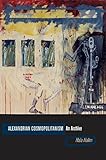Alexandrian Cosmopolitanism : An Archive / Hala Halim.
Material type: TextPublisher: New York, NY : Fordham University Press, [2013]Copyright date: ©2013Description: 1 online resource (448 p.)Content type:
TextPublisher: New York, NY : Fordham University Press, [2013]Copyright date: ©2013Description: 1 online resource (448 p.)Content type: - 9780823251766
- 9780823252282
- Cosmopolitanism in literature
- European literature -- 19th century -- History and criticism
- European literature -- 20th century -- History and criticism
- Literary Studies
- Middle Eastern Studies
- Urban Studies
- SOCIAL SCIENCE / Archaeology
- Bernard de Zogheb
- C.P. Cavafy
- Cosmopolitanism
- E.M. Forster
- Imperialism
- Lawrence Durrell
- Mediterranean
- alexandria
- egypt
- 809/.93358621 23
- PN56.3.A42 H35 2013eb
- online - DeGruyter
| Item type | Current library | Call number | URL | Status | Notes | Barcode | |
|---|---|---|---|---|---|---|---|
 eBook
eBook
|
Biblioteca "Angelicum" Pont. Univ. S.Tommaso d'Aquino Nuvola online | online - DeGruyter (Browse shelf(Opens below)) | Online access | Not for loan (Accesso limitato) | Accesso per gli utenti autorizzati / Access for authorized users | (dgr)9780823252282 |
Frontmatter -- Contents -- Figures -- Acknowledgments -- Abbreviations -- Introduction -- Chapter One. Of Greeks, Barbarians, Philhellenes, Hellenophones, and Egyptiotes -- Chapter Two. Of Hellenized Cosmopolitanism and Colonial Subalternity -- Chapter Three. Uncanny Hybridity into Neocolonialism -- Chapter Four. “Polypolis” and Levantine Camp -- Epilogue/Prologue -- Notes -- Works Cited -- Index
restricted access online access with authorization star
http://purl.org/coar/access_right/c_16ec
Interrogating how Alexandria became enshrined as the exemplary cosmopolitan space in the Middle East, this book mounts a radical critique of Eurocentric conceptions of cosmopolitanism. The dominant account of Alexandrian cosmopolitanism elevates things European in the city’s culture and simultaneously places things Egyptian under the sign of decline. The book goes beyond this civilization/barbarism binary to trace other modes of intercultural solidarity.Halim presents a comparative study of literary representations, addressing poetry, fiction, guidebooks, and operettas, among other genres. She reappraises three writers—C. P. Cavafy, E. M. Forster, and Lawrence Durrell—who she maintains have been cast as the canon of Alexandria. Attending to issues of genre, gender, ethnicity, and class, she refutes the view that these writers’ representations are largely congruent and uncovers a variety of positions ranging from Orientalist to anticolonial. The book then turns to Bernard de Zogheb, a virtually unpublished writer, and elicits his camp parodies of elite Levantine mores in operettas, one of which centers on Cavafy. Drawing on Arabic critical and historical texts, as well as contemporary writers’ and filmmakers’ engagement with the canonical triumvirate, Halim orchestrates an Egyptian dialogue with theEuropean representations.
Mode of access: Internet via World Wide Web.
In English.
Description based on online resource; title from PDF title page (publisher's Web site, viewed 03. Jan 2023)


